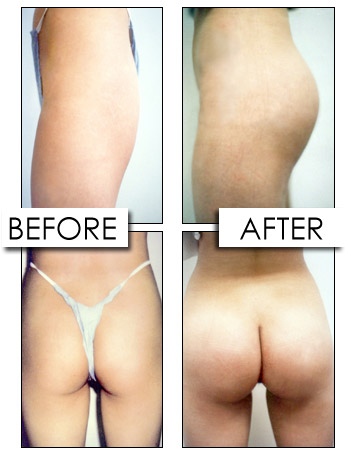A nice rounded butt is a goal shared by many who exercise countless hours on step machines or run up and down staircases. And yet, the buttock area is particularly resistant to change.
For those with stubborn, persistently-flat buttocks there is finally a way to achieve a perfect butt. Dr. Chugay has developed a plastic surgery procedure, which will do for butt what breast augmentation did for breasts (and without the dire consequences some have found with certain breast implants). Safe, practical and effective, Dr. Chugay has perfected a procedure to give you the perfectly round bottom you’ve always wanted.
*INDIVIDUAL RESULTS WILL VARY. IMAGES DO NOT CONSTITUTE A PROMISE OR REPRESENTATION OF ANY PARTICULAR OUTCOME OR EXPERIENCE.

HISTORY OF BUTTOCK AUGMENTATION
Since 1969, attempts have been made by plastic surgeons all over the world to find a solution to improve the shape of flat-looking buttocks. Numerous procedures and implants were developed which, while not managing to achieve the desired look, brought into being numerous complications and health risks.
Gel silicone implants
In the past, buttock implants were made of gel silicone, akin to those breast implants which have generated so much controversy. The ever present risk of rupture left many surgeons with a distaste for placing gel implants.
If an implant is ruptured, silicone gel can migrate anywhere in the body creating unpleasant lumps (granuloma) in some quite unexpected areas: under the skin on legs, arms, chest, belly; perhaps, even life-threatening lumps in internal organs. A ruptured implant can create potential secondary infections resulting in serious debilitation or death.
Water-based implants
Such implants are safer than their gel silicone counterparts in that they will not cause lumps and are not likely to cause secondary infection (after all, water is absorbed by the body.)
However, water-based implants can still rupture when thrust with a needle or squished with pressure resulting from a fall or sudden strain on the buttocks.
TRADITIONAL PLACEMENT OF IMPLANTS
Buttock implants were traditionally placed under the skin and fat, over the butt muscles. This was the habit of most surgeons because it was relatively simple and easily learned.
Such placement, however, did not produce the desired results. With age, on most patients, gravity caused implants to sag, creating an unpleasant appearance of the butt. Even after the removal of such implants, skin often remained sagging (not as much, but noticeably), its elasticity destroyed. Instead of an S-shaped behind, patients ended up with a hanging butt.
Even prior to the unfortunate sagging, the surgery results were quite often unsatisfactory, since implant edges often showed through the skin.
The incision was traditionally made (again, for the sake of simplicity) in the subgluteal crease (fold where the butt meets the upper leg). Such placement of the incision quite commonly created very visible and unpleasant scars.
FAT GRAFTING
To resolve the problems listed above, some surgeons developed a procedure called “autologous fat grafting.” In layman’s terms, they took fat from one place in the body and injected it into the butt.
Unfortunately, unlike the stubborn naturally-occurring butt fat, the grafted fat did not stay in the buttocks. With time, over 60% of the injected fat would get absorbed by the body, requiring new and costly injections.
Furthermore, this procedure did not produce firm buttocks; after all, fat is soft. Rather, it would produce a lumpy, cottage-cheese appearance to the butt.
Dr. Chugay, however, has recently begun using stem cells to augment the overall take of fat in the injected site. Using revolutionary stem cell technology, Dr. Chugay has increased the overall retention/permanence of fat injections from 40% to 90%. In a procedure that is performed in the operating room during your surgery, a biochemist will extract stem cells from your fat cells. These will then be combined with your fat cells and injected into the buttock region to give more fullness to the area.
DR. CHUGAY’S PROCEDURE FOR BUTTOCK AUGMENTATION
Dr. Chugay has developed a procedure, which resolved the problems listed above, yielding aesthetically pleasing surgical results with minimal scarring and no risk of implant rupture
Implant
In this procedure, a flexible, solid silicone implant is used. Due to scientific advances, gel silicone is no longer required. This solid implant is soft enough to look and feel natural. Solid silicone implants can not rupture. Consequently, the FDA does not frown on such implants (unlike gel silicone).
Dr. Chugay carefully designed solid silicone implants and designated AART Corporation to be their manufacturer. Each implant is custom-made; its appearance dependent on the patient’s anatomy and wishes.
Placement
Dr. Chugay has developed a revolutionary placement of the implant – between the butt muscles. Intramuscular placement was attempted by other physicians in the past. However, due to the difficulty of confining the implant to just the right area, many surgeons failed in their attempts.
The incision is made close between the butt cheeks; therefore, it is not visible to the naked eye. No more ugly scars!
Advantages
- No more sagging. Butt muscles keep the implant firmly lodged.
- Natural look. The implant is covered by muscle; it is not visible, and can not be found by touch.
- Deeper placement and the hardness of the implant eliminate rupture
- No secondary infections caused by implant rupture
- Prevention of seroma (accumulation of fluid in the area of the implant – potentially dangerous and unpleasant to the eye.). Special surgical drains rid the body of fluid, if any is accumulated.
AFTER SURGERY
Dr. Chugay recommends that patients stay off of their new butts for approximately 2 weeks to allow for healing to take place. Special dressings will be applied to the area post-operatively that will be removed on your first post-operative visit several days after surgery. After approximately one month, patients can slowly resume exercise at a less intense pace and are back to normal activity by 6 weeks after surgery.

